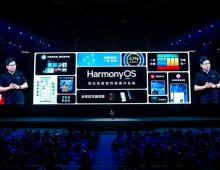
Huawei Outlines Computer Vision Plan, Releases Stable Version of openEuler OS
Huawei is opening up its Computer Vision algorithm code for global developers, and released the first Long-Term Support (LTS) edition, the openEuler 20.03 LTS.
Computer Vision Plan
Huawei announced the Computer Vision Plan (referred to the Vision Plan) and invited global AI experts to participate in the research. The Atlas AI computing platform powered by Huawei Ascend AI processors will provide computing to support this plan. The research results will be implemented in Huawei's MindSpore, an all-scenario AI computing framework open to the industry.
Huawei has been building basic capabilities in fields such as computer vision, natural language processing, and decision-making and inference. These capabilities are critical to developing efficient, green, secure and autonomous machine learning.
Tian Qi, Chief Scientist of Computer Vision, Noah's Ark Laboratory at Huawei, and IEEE Fellow, shared the latest research progress in computer vision. "Huawei has invested heavily in the basic research of computer vision with focus on data, knowledge, and models. In the past two years, Huawei has published more than 80 papers at leading AI conferences and journals such as CVPR, ICCV, NeurIPS, and ICLR. Huawei has made many groundbreaking achievements. These research results are opened to the industry in the forms of academic papers and source code. We invite global AI developers to research, develop, and deploy AI based on Huawei's existing research results."
Professor Tian Qi released the Huawei Computer Vision Plan. "Huawei will continue extensive investment in basic research, tackling the three fundamental obstacles to efficiently mine knowledge from massive data, design efficient models for visual recognition, and represent and store knowledge. Conquering the obstacles will help drive general intelligence."
Huawei's Vision Plan incorporates six sub-plans:
- Data Iceberg Plan: Use a small amount of annotated data to unleash the potential of massive unannotated data and support model training in small sample scenarios.
- Data Magic Cube Plan: Use multi-modal quantification, alignment, and fusion strategies to enhance the learning capability of models in real-world scenarios.
- Model High-touching Plan: Build large models on the cloud to explore the performance limits of various vision tasks.
- Mode Slimming Plan: Build efficient computing models on the device side to help various chips complete complex inference.
- Generic Vision Plan: Define vision pre-training tasks to build generalized vision models.
- V-R Integration Plan: Direct computer vision to real artificial intelligence via virtual-real integration.
At the same time, Professor Tian Qi said, "We welcome global AI researchers to join Huawei's Vision Plan to innovate and explore the future together. The powerful computing capability of Huawei Atlas AI computing platform will accelerate the implementation of the Vision Plan. The research results will be fully implemented on Huawei's all-scenario AI computing framework MindSpore and open to the industry, helping every AI developer."
OpenEuler-powered Commercial Editions
The openEuler community released the first Long-Term Support (LTS) edition, the openEuler 20.03 LTS, at Huawei Developer Conference 2020 (Cloud). In addition, Huawei and four OS vendors, Kylinsoft, iSoft, Uniontech, and the Institute of Software Chinese Academy of Sciences (ISCAS), announced the commercial editions powered by openEuler.

As the founding enterprise and main initiator of Linux -based openEuler, Huawei promotes the OpenEuler-based operating systems for the future multi-core heterogeneous computing industry.
As an open community, openEuler is a shared stronghold co-built by more and more global developers.
The openEuler source code was officially released on December 31, 2019. By March 25, the ISO has seen 5479 downloads, and a total of 5324 code contributions by 220 developers, according to Huawei.
The openEuler community will release an LTS edition every two years and an innovative edition every six months, and provide Common Vulnerabilities and Exposures (CVE) management capability.
Huawei says that the openEuler 20.03 LTS edition has demonstrated stability and security. Building on full-stack software, it could unlock the power of diversified computing platforms:
- Multi-core high concurrency: The file cache management mechanism has been lock-free optimized, improving Nginx HTTP concurrency by 15%.
- Integrated KAE plug-in: Software/hardware collaboration drives the Kunpeng processor hardware accelerator, enabling the Kunpeng acceleration library to help improve performance by 10% to 100%.
- iSula lightweight container: Being lightweight, fast, easy-to-use, and flexible, it slashes startup time by 35%, and drives down memory resource consumption by 68%.
openEuler community build of OpenJDK: It improves performance by 20% through optimization of memory management and compilation. - A-Tune: It provides intelligent, scenario-specific auto-tuning to improve system tuning efficiency by 30%.
- Broad architecture support: Compatible with the architectures of processors such as Kunpeng and x86, the OS will support more processor architectures in the future.
Vendors including Kylinsoft, iSoft, Uniontech, and ISCAS have actively supported the openEuler community, and take the lead to release commercial editions.
- Kylinsoft builds the Kylin Server OS based on openEuler kernels. It applies to multi-core heterogeneous computing scenarios, optimized for processing mission-critical services and data loads.
- iSoft launches iSoft Server OS V5.1 for Kunpeng, the first commercial release based on openEuler.
- Uniontech presents deepinEuler V1.0. The Kunpeng-based OS supports new features of the Kunpeng processor.
- ISCAS has officially released the EulixOS Server 1.0. In the future, ISCAS will initiate an open source software supply lightening program.
The openEuler community will provide training, enablement, and certification to OS vendors and developers for upskill and service improvement. The openEuler technical summit is planned in April for technical communication. Planning for openEuler 20.09 is also well underway.





















